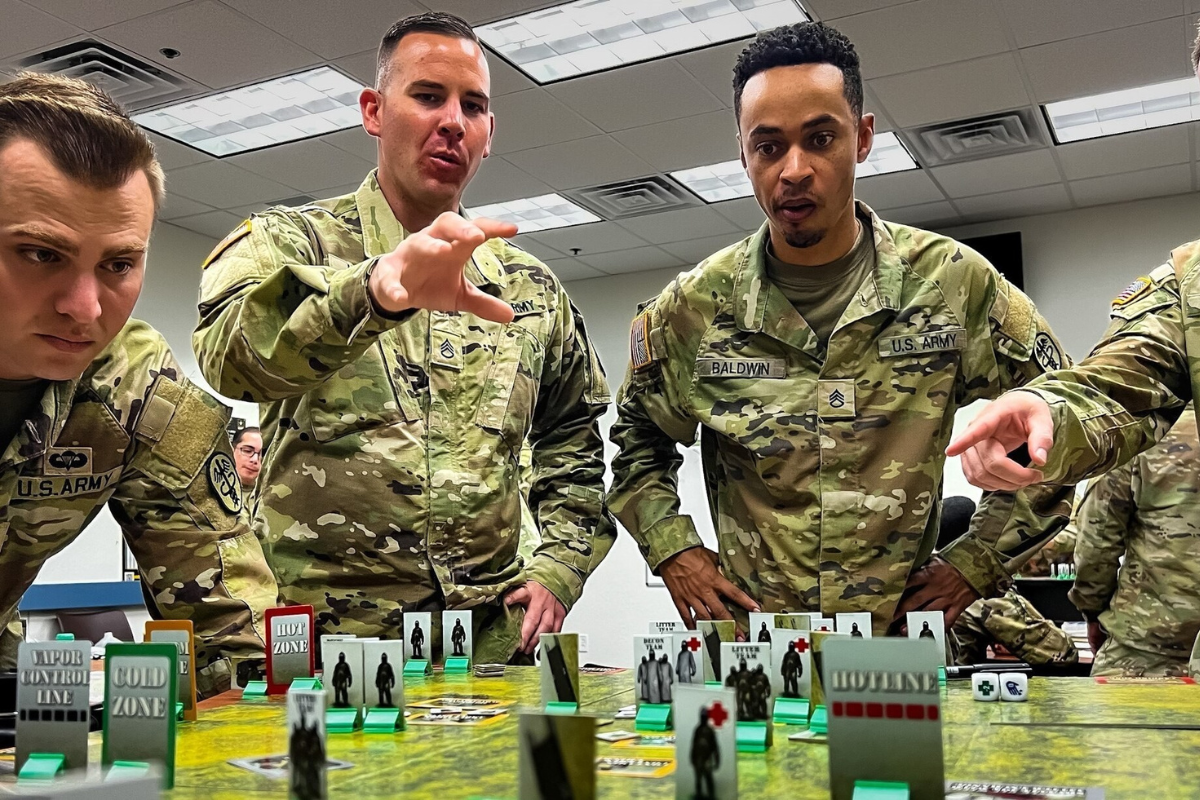
Effective Decision-Making: Military Strategies for Leaders
![]() Travis Eaton
Travis Eaton
![]() June 24, 2024
June 24, 2024
Effective decision-making stands as the cornerstone of successful leadership, whether in military operations or corporate boardrooms. It involves the ability to analyse situations swiftly, weigh options effectively, and take decisive action. Leaders who master this skill can steer their organisations through challenges with confidence, ensuring operational efficiency and achieving strategic goals. In military contexts, the impact of decisions can be immediate and profound, influencing outcomes on the battlefield or in critical missions. Thus, understanding the gravity of decision-making underscores its crucial role in leadership effectiveness. One of the most renowned frameworks for rapid decision-making is the OODA Loop - Observe, Orient, Decide, Act. Originating from military strategist John Boyd, this iterative process emphasises the importance of continuous observation, quick orientation to new information, decisive action, and adapting as the situation evolves. By adopting the OODA Loop, leaders can enhance their responsiveness and agility, crucial traits in dynamic environments where split-second decisions can determine success or failure. This framework not only facilitates quick decision-making but also fosters a culture of proactive leadership that anticipates challenges before they escalate. Military history is replete with examples showcasing the value of adaptability in decision-making. Leaders must anticipate changes in terrain, weather, or enemy tactics, requiring flexible responses to maintain operational effectiveness. For instance, commanders may adjust battle plans on the fly based on real-time intelligence or unexpected developments. This agility allows military units to exploit opportunities swiftly and mitigate threats effectively, highlighting the critical role of adaptability in decision-making processes. Strategic leadership hinges on aligning organisational vision with decisive actions. In the military, strategic leaders not only formulate clear objectives but also inspire troops to execute missions with precision and unity of purpose. By communicating a compelling vision and setting achievable goals, military commanders galvanise their teams towards common objectives. This alignment ensures that every decision made - from tactical manoeuvres to resource allocation - contributes cohesively to overarching strategic goals, fostering organisational resilience and sustained success. Effective decision-making requires a systematic approach to managing risks and uncertainties. Military leaders employ rigorous risk assessment frameworks to evaluate potential threats, identify vulnerabilities, and develop mitigation strategies. These proactive measures minimise adverse impacts on mission objectives and enhance operational safety. By prioritising risk management, leaders in both military and business contexts can navigate complexities with greater confidence, fostering a culture of preparedness and resilience within their teams. Clear and effective communication is paramount in decision-making processes, ensuring that intent, strategy, and directives are comprehensively understood by all stakeholders. In military operations, concise communication enhances situational awareness, coordinates efforts across diverse units, and accelerates decision implementation. Leaders adept at fostering open communication channels empower their teams to exchange critical information seamlessly, enabling swift adjustments to evolving circumstances. This proactive communication approach mitigates misunderstandings, minimises errors, and optimises decision outcomes, underscoring its pivotal role in effective leadership. Developing robust decision-making skills requires continuous training and deliberate practice. Military leaders undergo rigorous simulations, scenario-based training, and leadership development programmes to hone their ability to make informed decisions under pressure. These training initiatives cultivate resilience, sharpen critical thinking abilities, and instil confidence in leaders to navigate high-stakes situations with clarity and composure. By investing in ongoing development, organisations can nurture a pipeline of adept decision-makers equipped to tackle complex challenges and drive sustainable success. Translating military decision-making strategies into business leadership practices requires adapting principles of agility, strategic alignment, and risk management to corporate settings. Leaders can leverage military frameworks like the OODA Loop to streamline decision processes, foster innovation, and respond swiftly to market changes. By integrating these strategies, businesses can enhance operational efficiency, mitigate risks effectively, and achieve strategic objectives with precision. This approach not only enhances leadership effectiveness but also cultivates a culture of adaptability and proactive decision-making across all levels of the organisation. Ethical decision-making is paramount in both military and business leadership contexts, ensuring that actions align with organisational values and stakeholder expectations. Leaders must navigate moral dilemmas, uphold integrity, and demonstrate accountability in their decision-making processes. By adhering to ethical standards, leaders inspire trust, foster a positive organisational culture, and uphold their reputation in the industry. Ethical clarity guides leaders in making principled decisions that uphold the greater good, mitigate risks of ethical lapses, and sustain long-term organisational success.Understanding the Importance of Effective Decision-Making
Military Decision-Making Framework
Adaptability and Flexibility: Lessons from Military Tactics
Strategic Leadership: Aligning Vision with Action
Risk Management and Mitigation Strategies
Communication and Decision-Making
Training and Developing Decision-Making Skills
Implementing Military Decision-Making Strategies in Business
Ethical Considerations in Decision-Making

Recent Articles
Unlocking Your Leadership Potential: Combining Military Discipline with Modern Psychology
The Importance of Effective Le...
![]() Jun 29, 2024
Jun 29, 2024
The Art of Leadership: Lessons from a Military Veteran Turned Leadership Coach
Understanding Leadership in th...
![]() Jul 05, 2024
Jul 05, 2024
From Battlefield to Boardroom: Military Strategies for Effective Leadership
Understanding Military Leaders...
![]() Jul 06, 2024
Jul 06, 2024
Developing Your Unique Leadership Style: Insights from Military-Based Coaching
Understanding Military-Based L...
![]() Jul 03, 2024
Jul 03, 2024
Mastering Emotional Intelligence: A Key Component of Modern Leadership
Understanding Emotional Intell...
![]() Jul 12, 2024
Jul 12, 2024
Overcoming Leadership Challenges: Strategies from a US Army Infantry Veteran
Leadership challenges are ubiq...
![]() Jul 07, 2024
Jul 07, 2024
Creating a Personalised Leadership Roadmap: A Comprehensive Guide
Effective leadership isn't jus...
![]() Jul 11, 2024
Jul 11, 2024
The Power of Self-Awareness in Leadership: Techniques and Tips
Understanding Self-Awareness i...
![]() Jul 10, 2024
Jul 10, 2024
Leadership Empowerment: Blending Military Experience with Psychological Coaching
Understanding Military-Based L...
![]() Jul 04, 2024
Jul 04, 2024
Navigating Leadership Roles: From Aspiring Leader to Seasoned Manager
Understanding Leadership Devel...
![]() Jul 09, 2024
Jul 09, 2024
Building Strong Teams: Lessons in Diversity and Inclusion from Military Leadership
Understanding Military-Based L...
![]() Jul 02, 2024
Jul 02, 2024
Enhancing Your Communication Skills: Military Techniques for Modern Leaders
The Importance of Communicatio...
![]() Jul 01, 2024
Jul 01, 2024
Setting and Achieving Leadership Goals: Proven Strategies for Success
Effective leadership is not ju...
![]() Jul 08, 2024
Jul 08, 2024
Cultivating Confidence as a Leader: Military Insights and Psychological Practices
Understanding Leadership Confi...
![]() Jun 28, 2024
Jun 28, 2024
The Importance of Focus in Leadership: Techniques from CORE Leadership Coaching
Understanding the Essence of F...
![]() Jun 27, 2024
Jun 27, 2024
Becoming a Resilient Leader: Lessons from the Frontlines
Understanding Resilience in Le...
![]() Jun 26, 2024
Jun 26, 2024
Navigating Career Transitions: How to Move into Leadership Roles
Understanding the Path to Lead...
![]() Jun 25, 2024
Jun 25, 2024
Developing a Strong Leadership Presence: Tips from a Professional Coach
Understanding Leadership Prese...
![]() Jun 23, 2024
Jun 23, 2024
Leadership Coaching for New Managers: Building a Solid Foundation
Navigating the transition into...
![]() Jun 22, 2024
Jun 22, 2024
The Role of Spiritual Awareness in Leadership Development
Understanding Spiritual Awaren...
![]() Jun 21, 2024
Jun 21, 2024
Leadership and Personal Growth: A Holistic Approach to Success
Understanding the Interconnect...
![]() Jun 20, 2024
Jun 20, 2024
The Future of Leadership: Integrating Traditional Values with Modern Practices
Defining Leadership in a Chang...
![]() Jun 19, 2024
Jun 19, 2024
